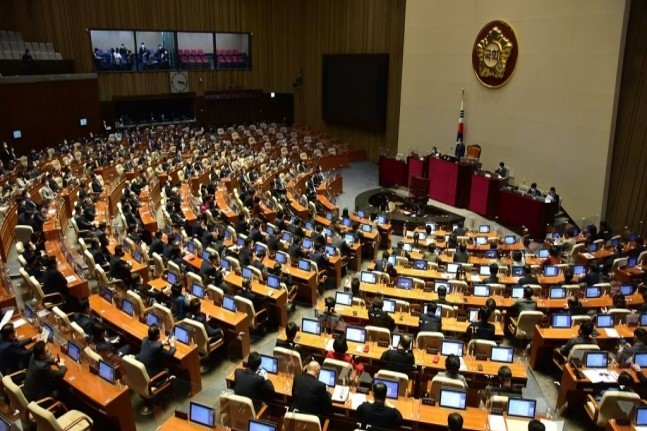[News Focus] Revised laws may have big ramifications for major conglomerates
Samsung, Hyundai ownership families may have to offload massive shares in key subsidiaries
By Shin Ji-hyePublished : Dec. 10, 2020 - 16:12

South Korean businesses on Thursday cried foul over the passage of what they called anti-business bills, saying the revisions could threaten management controls and put pressure on them at a time of unseen hardships stemming from the pandemic.
Among the bills that passed the National Assembly on Wednesday, a revision to the Commercial Act regarding the “3 percent rule” has been met with the most criticism.
The amendment requires listed companies to elect at least one auditor from outside their boards and limits the voting rights of the largest shareholders to 3 percent for the auditor’s appointment.
The 3 percent cap applies to individuals who meet the criteria to be considered the largest shareholders. This means if there are four members of a family controlling a business group classified as the largest shareholders, they can exercise up to 12 percent of voting rights.
Although the change is aimed at reinforcing checks and balances in corporate governance, some businesspeople have taken it as a huge potential threat to management control. They called for measures to protect management rights.
An association of listed companies on Thursday issued a statement saying that the law change would allow companies to fall prey to “foreign speculative capital.”
“The revision allows foreign shareholders to exert far greater influence on local companies with fewer equity stakes,” it said.
Under the revised bill, the controlling shareholders of tech giant Samsung Electronics can exercise 12.2 percent of voting rights, compared to 27.61 percent for all foreign shareholders combined, according to a recent analysis by the Federation of Korean Industries business lobby.
The same goes for chipmaker SK hynix, search platform operator Naver and battery supplier LG Chem, whose majority shareholders’ voting rights are less than half those of foreign shareholders.
The FKI, in a statement Wednesday following the bill's passage, called for countermeasures, including one that prohibits external auditors from doubling as board members. It said the board of directors is the main decision-making body of a company and directors could gain access to key information about the company.
“Since the bill passage has created a ‘sloping playground’ where the business environment is unilaterally favorable to overseas speculative capital, a means of defending management rights should be introduced as soon as possible,” it said. “We urge that supplementary measures be prepared as soon as possible before the implementation of the revised law.”
Park Yong-maan, chairman of the Korea Chamber of Commerce and Industry, another major business body, echoed the demand.
“The most talked-about issue was to increase the effectiveness of the corporate auditor system and to keep (companies) in check.
“I hope that the issues of increasing the efficiency of the auditors and (their) entering of the board of directors should be separated. We really hope this companies’ opinion is accepted.”
The National Assembly on Wednesday passed a set of bills pertaining to corporate regulations and labor union organization, among other matters. The amendment of the Commercial Act was part of the three “fair economy” proposals that aim to tighten regulations on corporate governance and strengthen financial penalties for those who violate them.
Parliamentarians also enacted a change in the country’s ban on intragroup deals. Under current rules, a business group’s controlling family is subject to intragroup trading rules if they hold more than 30 percent of shares in any of its listed subsidiary companies. The bar will now be lowered to 20 percent.
This means Hyundai Motor’s ownership family -- Chairman Chung Euisun and his father, Chung Mong-koo -- will have to reduce their equity holdings in Hyundai Glovis, a logistics unit of the group to avoid legal risks. They now own a combined 29.9 percent stake in the firm.
The father and son had a combined 43.4 percent stake in Hyundai Glovis at the end of 2014, but due to the ban they reduced their shares to the current level by selling a large amount. The additional revision is expected to affect the restructuring of Hyundai Motor Group’s governance structure, as they will have to dispose of about 10 percent of their shares again.
Samsung Life Insurance, SK and Hanwha will also be newly affected by the intragroup deal regulation. Samsung’s ownership family holds 20.82 percent of shares in Samsung Life Insurance, while the figure is 28.59 percent for SK and 26.76 percent for Hanwha.
By Shin Ji-hye (shinjh@heraldcorp.com)








![[KH Explains] How should Korea adjust its trade defenses against Chinese EVs?](http://res.heraldm.com/phpwas/restmb_idxmake.php?idx=644&simg=/content/image/2024/04/15/20240415050562_0.jpg&u=20240415144419)











![[Today’s K-pop] Stray Kids to return soon: report](http://res.heraldm.com/phpwas/restmb_idxmake.php?idx=642&simg=/content/image/2024/04/16/20240416050713_0.jpg&u=)